In 1977, Robin Shirley, who had been a post-grad at UCL when I was an undergraduate, invited me to be part of a project creating computer-generated poetry, and then performing it to jazz accompaniment. Sunflowers, the group for performing the work, comprised Randy MacDo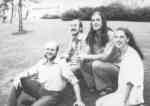 nald, a fantastic jazz saxophonist and flautist; the actor and musician, Gus Garside; poet and crystallographer Robin Shirley; and me. I was lecturing in Philosophy at Surrey University at the time, but was also a poet and musician. The biographical notes that appeared in the programmes for some of our performances are at the bottom of the page, below the sample poem.
nald, a fantastic jazz saxophonist and flautist; the actor and musician, Gus Garside; poet and crystallographer Robin Shirley; and me. I was lecturing in Philosophy at Surrey University at the time, but was also a poet and musician. The biographical notes that appeared in the programmes for some of our performances are at the bottom of the page, below the sample poem.
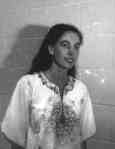
I was young and fancy-free, and didn’t really take the project terribly seriously, though I was happy both to help create the poetry and also to perform the jazz. However, the whole thing took off, and before long we were receiving invitations to perform in various places, including one performance for BBC Radio, and one at a major computer conference.
By the time we moved on to other adventures, we had yards and yards of computer print-out of poetry, a number of photographs and some good newspaper cuttings and reviews. Then … it all disappeared, and for over 30 years I couldn’t find the files in which these archives were stored.
Then, a few months ago, I was approached by Jerome Fletcher of Falmouth University, who is doing some research into electronic literature in the UK between 1960 and 2010, to ask if I could provide information about Sunflowers. This led to total immersion in some of the boxes that were stored upstairs at home, and to my delight I was able to unearth at least some of the material. Hence this blog, to share a slice of history. Unfortunately most of the newspaper cuttings have not yet emerged, and the photos are rather faded; but this page should give a taste of what we were doing.
The general idea was to feed phrases into a computer that would make sense in whichever order they t hen came out, and for each phrase we had to determine what the probability was of its occurring, and the possibility we wished to allow for that phrase to be repeated. The skill, obviously, was in choosing the best phrases to feed in; and some of the results were strikingly good. The computer programme we used was devised by Robin using the ICL 1905F computer at the University of Surrey.
hen came out, and for each phrase we had to determine what the probability was of its occurring, and the possibility we wished to allow for that phrase to be repeated. The skill, obviously, was in choosing the best phrases to feed in; and some of the results were strikingly good. The computer programme we used was devised by Robin using the ICL 1905F computer at the University of Surrey.
It was called Bard 0, ![]() and was followed by Bard 1D and Bard 2S.
and was followed by Bard 1D and Bard 2S.
The one cutting that has turned up was in the Computer Bulletin in March 1979, and in it John Lansdowne, reviewing our appearance at the Computer Arts Society, writes: ‘It says much for the quality of the poetry and the way it was presented by Robin Shirley, Alwyn Marriage, Gus Garside and Ranald MacDonald that they were able to give two consecutive 40-minute performances to enthralled audiences of all ages. The poem for three voices, May Carol,was especially well received, and I look forward to hearing the Wheel of Seasons cycle in full on some occasion when I’m not trying to run a computer art show at the same time.’
 An early version of The Sunflower Suite had been performed at the 1973 Edinburgh Festival, and as well as developing that further, we created ot
An early version of The Sunflower Suite had been performed at the 1973 Edinburgh Festival, and as well as developing that further, we created ot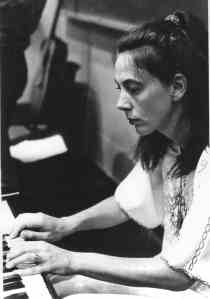 her works during our time together, including ‘Pavan for the Children of Deep Space’ and the extended group of poems in the popular suite ‘The Wheel of Seasons’. We then took all these works and jazz improvised to them, using sax, flute, guitar and bass guitar, keyboard, voice and various percussion instruments. It was all good fun.
her works during our time together, including ‘Pavan for the Children of Deep Space’ and the extended group of poems in the popular suite ‘The Wheel of Seasons’. We then took all these works and jazz improvised to them, using sax, flute, guitar and bass guitar, keyboard, voice and various percussion instruments. It was all good fun.
 Randy and I decided to stand on our heads to celebrate the upside-downness of the world.
Randy and I decided to stand on our heads to celebrate the upside-downness of the world.
Sadly, Robin contracted hepatitis on a work trip to Egypt, and died far too young. Without his drive, the group drifted apart. If anyone knows Ranald MacDonald or Gus Garside, please let me know.
With apologies for the poor quality of the photographs, some of which were actually scanned from tiny contact prints on our home scanner. I think it’s worth preserving them for their historical importance – and for reminding me of what I looked like when I was young!
Sample poem from the Spring section of The Wheel of Seasons:
Flow
A girl is dancing, singing after her tears, dreaming of the sea.
How many springs are feeding the river
reaching further into before?
Crustaceans waiting for the end of primrose conversation,
we are borne along, breathless, to inevitable growth.
There is a growing urgency.
How many springs are feeding the river,
eddies of doubt, stagnant pools of rejection, reaching further into before?
The present is opening into the future,
old, young, dancing, dying, dreaming of the sea.
Eddies of doubt, stagnant pools of rejection,
lines of love etched deep on chalk and clay,
reaching further into before, swirling in triumphant confidence;
in the changing, in the compliance, is the growing.
A girl is dancing, singing after her tears.
There is temporary pain in the confluence,
in the changing, in the compliance, is the growing old young dancing dying.
A girl is dancing, singing after her tears
from spring through singing to ocean swell,
lines of love etched deep on chill and clay
dreaming of the sea.

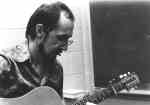
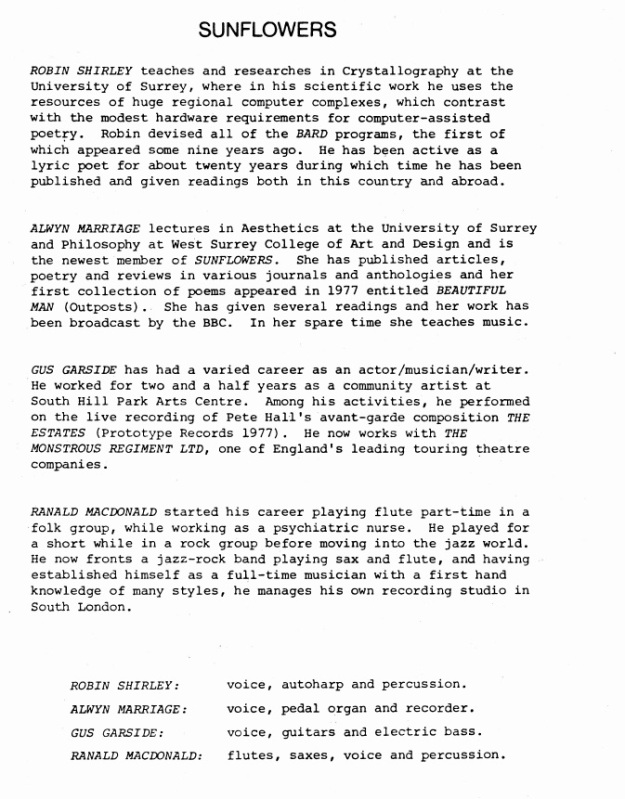

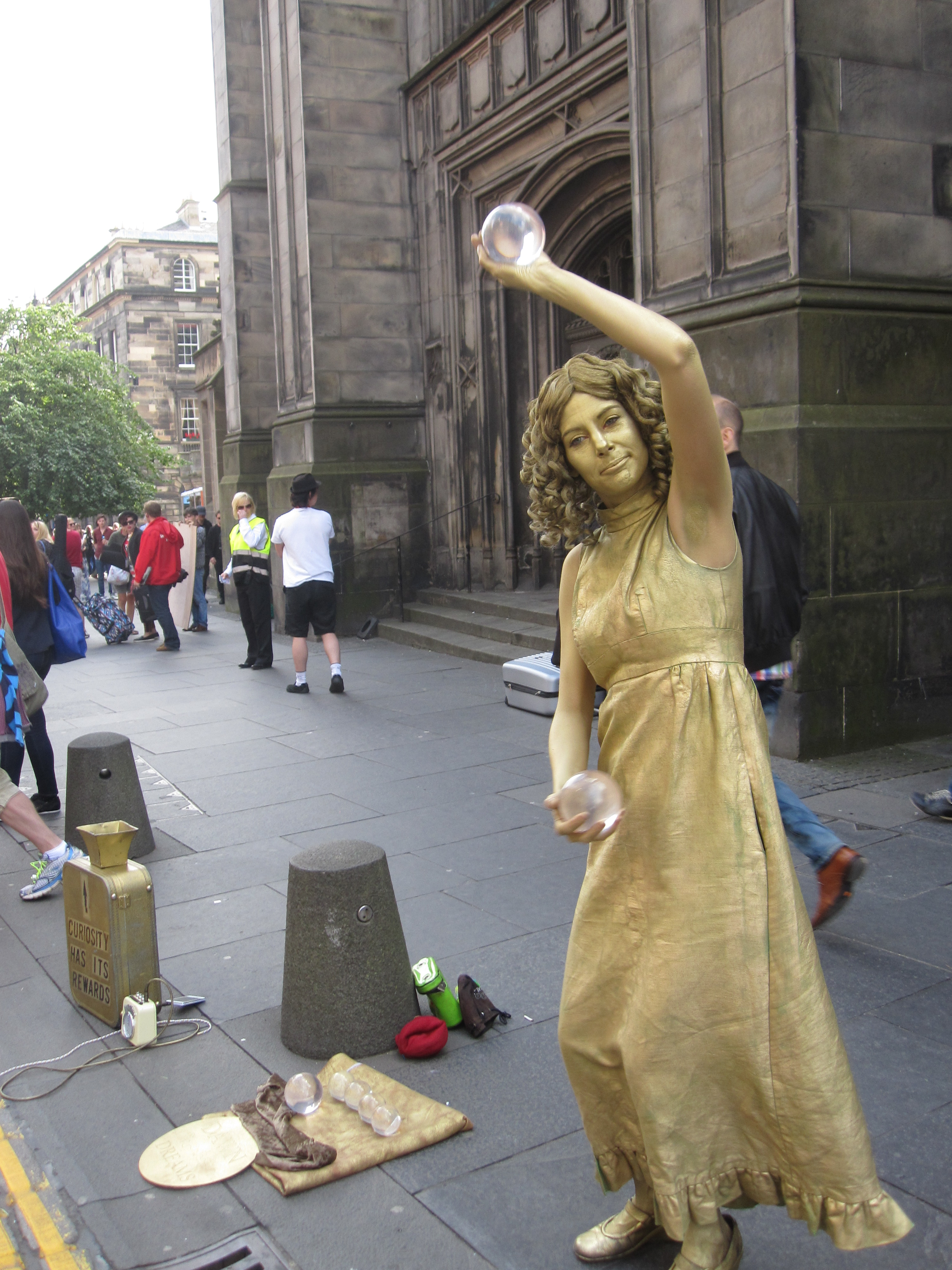 and mostly good-natured. There are jugglers, actors, musicians and every other sort of entertainment imaginable – and many of them are touting for audiences for their shows; so unless hands are firmly kept in pockets, they are soon filled with leaflets about the many and various delights on offer.
and mostly good-natured. There are jugglers, actors, musicians and every other sort of entertainment imaginable – and many of them are touting for audiences for their shows; so unless hands are firmly kept in pockets, they are soon filled with leaflets about the many and various delights on offer. 









